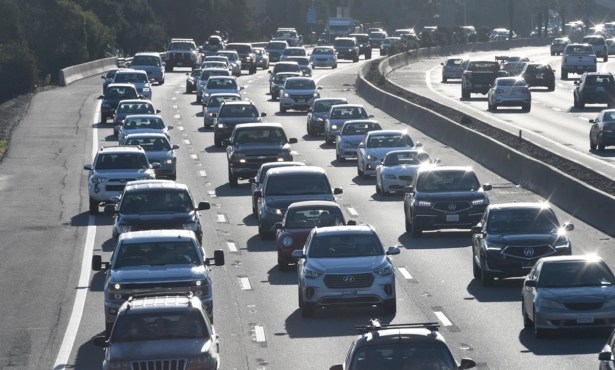Oil Trucks and Climate Crisis at Planning Commission
More Action Is Needed, Not More Fossil Fuels

ExxonMobil plans to restart three offshore oil platforms and Las Flores Canyon oil processing plant, then transport the oil in tanker trucks as a replacement for the pipeline that burst near Refugio and El Capitan Beaches in May 2015. Here’s why you need to pay attention and take action:
Seventy tanker trucks fully loaded with 5,000-6,500 gallons of crude oil will travel each day on US 101 and State Route 166 from Las Flores Canyon on the Gaviota Coast to refineries in North County. That’s 70 round trips per day, 24 hours a day, seven days a week for seven years. That’s one tanker truck passing by you on the freeway every 10 minutes, all day long, every day. Considering the narrow, winding road, dense fog, and high winds at the Gaviota Tunnel, the chances of an oil truck hitting you or driving off the road are substantial. According to the Environmental Defense Center, 79 tanker trucks have crashed in California in the past 21 years, killing 28 people and injuring 56 others. One mitigation proposed by planning staff was to not allow truck transportation on rainy days. One recent crash in March 2020 on SR 166 dumped oil into the Cuyama River near Santa Maria. It was not raining. In 2017, a tanker truck spilled its load onto the US 101 near Carpinteria, dissolving the roadway and killing the driver. Are you concerned yet?
Aside from death and damage to roads, the environmental impacts of oil spills are catastrophic. Oil spills into the ocean and rivers, killing marine and terrestrial animals, disrupting ecosystems, and contaminating water supplies. These issues impact all of us. That should concern you.
Let’s talk about the climate crisis: There is no longer any doubt that the changing climate is a real crisis, fueled by our continued use of fossil fuels. We are the primary cause of rising sea levels and record-breaking heat waves, droughts, floods, and storms — to name the most obvious effects of the crisis.
The amount of carbon that will be produced if ExxonMobil’s project is approved is startling. The planet has already warmed by more than one degree Celsius, which means we are halfway to the beginning of the end of human habitation in coastal areas and the end of viable agriculture all around the world. The UN’s Intergovernmental Panel on Climate Change (IPCC) calls our situation a Code Red, which requires immediate remedial action — not more oil! This should really concern you, especially if you have children and grandchildren, or plan to at some point. It is their future you hold in your hands, at your keyboard, at the ballot box.
During Wednesday’s hearing, the Planning Commission heard public testimony and voted to deny Exxon’s project. The final decision on this project will be made by the Board of Supervisors at a later date. Stay tuned, prepare to send them your thoughts. Your contributions to the process matter.
The Planning Commission determined that there are “serious adverse impacts that cannot be mitigated.” Our question to the commission is: Why are you even discussing approving a project with impacts that cannot be mitigated? Additionally, it was disclosed that the restarted Las Flores Processing Plant will use fossil fuels to power the steam generator which prepares crude oil for the tanker trucks. This would certainly cause additional greenhouse gas emissions. Both of these issues require further clarification before the Board of Supervisors can make a final decision.
It should be noted that all commissioners (except one, for reasons of collecting oil tax revenue) cited the project’s high potential for environmental catastrophe and serious contribution to the climate crisis. Bravo!



